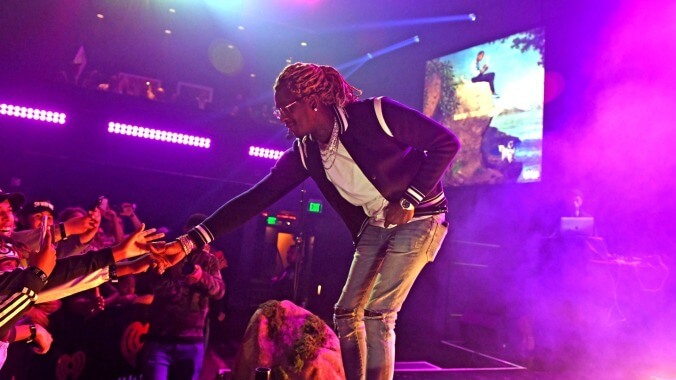Read This: a deep dive into the expansive, troubling indictment of Young Thug's YSL label
The Atlanta innovator spent years building a vibrant coalition of trappers. Now, Thug and more are being tried on their lyrics in criminal court. What happened?

Life regularly imitates art; whether that happens whimsically, poignantly, or frighteningly just depends on the mood of the universe. But sometimes, the eerie similarities between an artwork and an ensuing momentous real-life moment feel downright prescient. The 2015 Key & Peele sketch “Rap Album Confessions” is one of those artworks: a sarcastic send-up of the criminal justice system that, years later, would become all too sincere in the case of Young Thug and his Young Stoner Life label.
In the clip, Jordan Peele plays a rapper facing an interrogation by a detective (Keegan Michael Key) who is all-too-certain his perp is pinned, based on the evidence in his rap music. Peele also isn’t worried, however: they’re just lyrics, he insists, and it’s just a song. “I have a vivid imagination,” Peele deadpans after Key plays back a verse where he shares specific details about a murder. The joke plays on the fact that Peele’s lyrics make it maddeningly clear (if to be taken seriously) that he did commit a crime. But its real satire falls on the fact that it’s inherently ridiculous to convict based on a lyric in a creative work— if that were a legal standard, wouldn’t Sublime have faced a hard time for this by now?
Seven years later, a new and far bleaker vision of the clip played out as Young Thug (real name Jeffery Williams), who since 2016 has fostered a vibrant coalition of multigenerational trappers with his label Young Stoner Life, was arrested alongside 27 label-mates, including Gunna. Per the charges, members of YSL violated Georgia’s Racketeer Influenced and Corrupt Organizations (RICO) Act—allegations that align the label more with criminal gang activity than collaborative art-making. In a new article, The Face’s Christina Lee chronicles Williams’ life and career, the story of how a once-divisive creator who grew to shape the mainstream, became embroiled in “a legal saga that has halted his career at its commercial peak and, with his lyrics being employed against him by prosecutors, reignited the debate around using art as evidence in court.”
The Face boldly asserts that Williams is “one of the artists to have most reshaped contemporary hip-hop in his image,” but Lee backs it up deftly and artfully in her piece, which we highly recommend you read in full here. Lee paints an expansive portrait of Williams’ rise from an energetic, wildly creative teenager calling himself the next Lil Wayne to a definitive voice in hip-hop whose stylistic influence can be found in the countless rap superstars that followed him.









![Rob Reiner's son booked for murder amid homicide investigation [Updated]](https://img.pastemagazine.com/wp-content/avuploads/2025/12/15131025/MixCollage-15-Dec-2025-01-10-PM-9121.jpg)

























![HBO teases new Euphoria, Larry David, and much more in 2026 sizzle reel [Updated]](https://img.pastemagazine.com/wp-content/avuploads/2025/12/12100344/MixCollage-12-Dec-2025-09-56-AM-9137.jpg)




